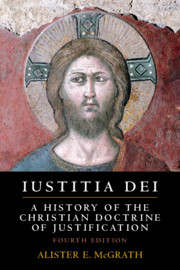Book contents
- Iustitia Dei
- Iustitia Dei
- Copyright page
- Contents
- Tables
- Preface to the Fourth Edition
- Abbreviations
- Introduction
- Part I Justification
- 1 The Hebraic Context
- 2 Paul and the Shaping of the Christian Tradition
- 3 The Fountainhead
- Part II The Middle Ages
- Part III Protestantism
- Part IV Catholicism
- Part V The Modern Period
- Conclusion
- A Brief Glossary of Medieval Soteriological Terms
- Works Consulted
- Index
2 - Paul and the Shaping of the Christian Tradition
from Part I - Justification
Published online by Cambridge University Press: 27 January 2020
- Iustitia Dei
- Iustitia Dei
- Copyright page
- Contents
- Tables
- Preface to the Fourth Edition
- Abbreviations
- Introduction
- Part I Justification
- 1 The Hebraic Context
- 2 Paul and the Shaping of the Christian Tradition
- 3 The Fountainhead
- Part II The Middle Ages
- Part III Protestantism
- Part IV Catholicism
- Part V The Modern Period
- Conclusion
- A Brief Glossary of Medieval Soteriological Terms
- Works Consulted
- Index
Summary
This chapter deals with the importance of the New Testament epistles of Paul, particularly Romans and Galatians, in the shaping of early Christian thinking on justification. After an initial overview of the wider importance of Paul, the emerging scholarly consensus that Paul was much more widely cited and used by early Christian writers than was thought a generation ago is explored. The chapter then focusses on three broad areas relating to justification in the pre-Augustinian tradition: the early phase from Irenaeus to Origen, the fourth century in the Greek East, and the fourth century in the Latin West, focussing particularly on Ambrosiaster. During the fourth century, the Pauline commentary emerged as a particularly important means of theological exploration and development in the Latin West, and had a clear impact on the consolidation of the western church’s theological vocabulary, particularly relating to justification. The chapter focusses particularly on how early Christian writers understood the Pauline phrase 'works of the law', noting that this was generally understood specifically in terms of the observance of the Mosaic law and its rituals. The way in which Paul's doctrine of justification by faith acts as a framework for discussing heilsgechichtliche issues – such as the faith of Abraham – is also noted.
- Type
- Chapter
- Information
- Iustitia DeiA History of the Christian Doctrine of Justification, pp. 26 - 41Publisher: Cambridge University PressPrint publication year: 2020

